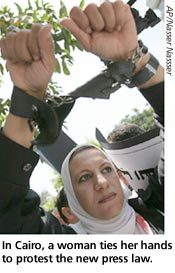New York, July 12, 2006— The Committee to Protect Journalists is deeply troubled by Egypt’s newly amended press law that fails to honor a promise by President Hosni Mubarak to abolish prison for press offenses. The law also sharply increases fines for defamation.
The amendments lift some minor restrictions on the media but still mandate prison sentences for journalists convicted of insulting the president and foreign heads of state. The National Assembly, which is controlled by Mubarak’s National Democratic Party, passed the bill after a last-minute intervention by the President to drop a clause stipulating jail terms for journalists who defamed public officials with allegations of corruption.
Under the law, journalists face imprisonment for publishing “false” information, defaming the president and foreign heads of state, and insulting state institutions such as parliament, the judiciary, and armed forces. Prison sentences run as high as five years.
The amended law scraps some articles from the previous law that specified prison terms. In a highly publicized move, Mubarak, just before signing the law, cancelled a much-criticized amendment that would have stipulated jail time of up to three years for journalists who wrote about the financial activities of government officials. Mubarak promised two years ago to end all prison sentences for journalists.
In a move that has triggered concerns that the government may attempt to financially cripple outspoken newspapers, the law doubles fines for journalists and editors convicted of defamation and a range of vaguely worded offenses. Fines now reach as high as 40,000 LE (US$7,000).
“Egyptian journalists are hardly better off today than they were before this law, said CPJ Executive Director Joel Simon. “ Journalists can still be locked up for what they write, and now they are subject to more onerous fines that can be used to silence them. Egypt will need to go beyond half-measures and smoke screens if it is serious about upholding basic press freedoms.”
In 2006 alone, CPJ has documented the cases of at least three journalists sentenced to jail on defamation charges for their criticism of government officials and other influential figures. Just last month, a court sentenced Ibrahim Eissa, editor of the independent weekly Al-Dustour, and Sahar Zaki, a reporter for the paper, to a year in prison for insulting Mubarak. The case against Eissa and Zaki stems from an article that reported efforts by an Egyptian lawyer to take Mubarak and his family to court on allegations of corruption, including the alleged misuse of foreign aid.
Egyptian journalists had been pressing the government to amend criminal laws since Mubarak’s promise to end jail terms. In recent days, they staged demonstrations and more than 20 newspapers halted publication for a day last week in protest.
